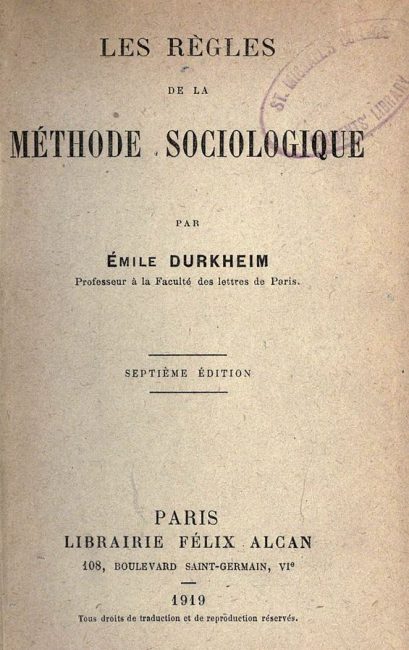
Émile Durkheim (1858-
On November 15, 1917, French sociologist David Émile Durkheim passed away. Durkheim formally established the academic discipline and — with W.E.B. Du Bois, Karl Marx and Max Weber — is commonly cited as the principal architect of modern social science.
“For if society lacks the unity that derives from the fact that the relationships between its parts are exactly regulated, that unity resulting from the harmonious articulation of its various functions assured by effective discipline and if, in addition, society lacks the unity based upon the commitment of men’s wills to a common objective, then it is no more than a pile of sand that the least jolt or the slightest puff will suffice to scatter.”
– Émile Durkheim, quoted in [9]
Background and Education
Émile Durkheim was born and grew up in Épinal, Lorraine as the son of a sternly religious Jewish family. But even though Durkheim decided not to follow his parent’s footsteps in the religious sense, he remained in the Jewish community and later even collaborated with several prominent members of the association.
After some attempts to study in Paris at the ‘Ècole normale supérieure’, he was finally accepted and learned together with his later famous classmates Jean Jaurés or Henri Bergson. After graduating, he started teaching philosophy and later moved to Germany where he was able to study sociology and publish several works on social science and philosophy. In 1887, Durkheim received a teaching appointment for sociology and philosophy in Bordeaux, which was the university’s first course in social sciences.
Major Works
It was also in Bordeaux, where he married Louise Dreyfus with whom he later had two children and where he mastered three of his major works:
- ‘The Division of Labour in Society‘
, Durkheim’s dissertation, was published in 1893 and influenced by Auguste Comte. Durkheim describes how an individual can be autonomous and dependent on society at the same time. He rejects authoritarian domination and interprets society as a collective, which performs social obligations as a result of normative commitments and sanctions.
- ‘Rules of Sociological Method‘
was published in 1895. The book was revolutionary, because of Durkheim’s argument, that social sciences and natural sciences are supposed to be approached with the same scientific methods. Today its content is discussed in many sociological debates.
- ‘Suicide‘
was published in 1897. The results of this case study of suicide outline for example that suicide rates are higher for those who are single, without children, and male.
Impact
In 1896 he founded the first French social science journal ‘L’Année Sociologique’ and published 12 volumes with like-minded people and students of himself. Durkheim reached his goal of becoming professor of the chair for the ‘Science of Education’ at the University of Sorbonne in Paris in 1902. Later on he also did advisory work for the Ministry of Education.

Cover of the French edition of The Rules of the Sociological Method
To the well-known students of Durkheim belong Marcel Mauss, Durkheim’s nephew, and Maurice Halbwachs. The school around Durkheim and the Année Sociologique are sometimes blamed for the fact that researchers who did not follow Durkheim, such as Gabriel Tarde and Arnold van Gennep, were undeservedly forgotten. After his death, Durkheim continued to influence many thinkers in France, including the founders of the Collège de Sociologie, Claude Lévi-Strauss, Michel Foucault and others from the French structuralist world. Pierre Bourdieu also repeatedly falls back on Durkheim. In Great Britain, Durkheim was particularly intensively studied by the ethnological movement there. Malinowski and Alfred Radcliffe-Brown dealt in particular with Durkheim‘s work in the functionalist variations of British social anthropology at Bronisław. Durkheim’s legacy in modern sociology was made fruitful above all by Talcott Parsons, who brought the critique of utilitarianism to the fore.
In recent times, Durkheim has been used again for a theory that can explain the change in values in society and the development of the moral autonomy of the individual.
Alan MacFarlane, 6. Lecture on Emile Durkheim (1858-1917), [9]
References and Further Reading:
- [1] (in German) Ohnmächtiger Staat?: Über die sozialen Mechanismen staatlichen Handelns
, Jürgen Mackert, 2006
- [2] Durkheim at Wikidata
- [3] Durkheim at Britannica Online
- [4] Durkheim Biography
- [5] Max Weber – one of the Founders of Sociology, SciHi Blog
- [6] Marianne Weber and the Status of Women, SciHi Blog
- [7] Karl Marx and Das Kapital, SciHi Blog
- [8] Emile Durkheim Timeline Query via Wikidata
- [9] Alan MacFarlane, 6. Lecture on Emile Durkheim (1858-1917), Cambridge University, Prof Alan Macfarlane – Ayabaya @ youtube
- [10] Kenneth Allan (2012). Explorations in Classical Sociological Theory: Seeing the Social World: Seeing the Social World, p. 151






that photo is Max Weber, )0.0( OMG
Sorry for the mistake and thank you for your help! 🙂